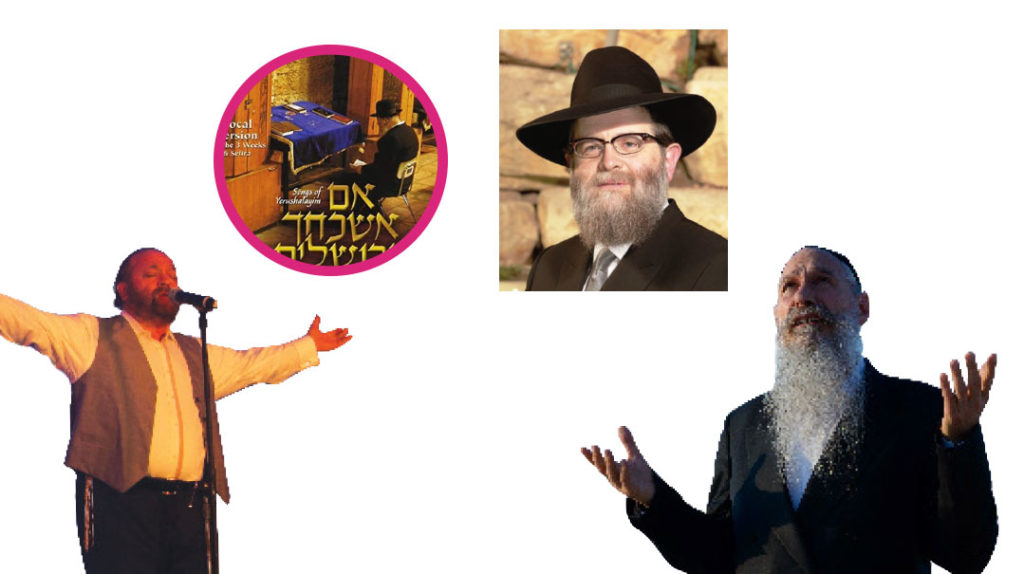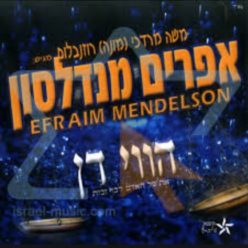Somehow, in the depth of pain and mourning that is Megillas Eichah, we’ve found snatches of solace, and made them our songs of yearning and dreams
It’s the saddest of all stories, a lament to our irreplaceable loss. But somehow, in the depth of pain and mourning that is Megillas Eichah, we’ve found snatches of solace, and made them our songs of yearning and dreams
BURIED NIGGUN
Song: “Tzaddik Hu Hashem”
Album: Ephraim Mendelson’s Hevei Dan
This jewel of a song — “Tzaddik hu Hashem ki pihu marisi… re’eh, Hashem, mei’ai charmarmaru, nehepach libi, nehepach libi b’kirbi — Hashem is righteous, though I have rebelled against His word… See, Hashem, my innards are burning, my heart is turned inside me” — expresses the excruciating physical and emotional pain that results from separation and rebellion.
Singer Ephraim Mendelson recalls how he brought it out of potential oblivion. “I was collating songs for my album, and a composer told me he had recently composed something beautiful that I should listen to and consider. In those days, recording meant using a cassette tape. He said he didn’t have a clean cassette handy when he came up with this new song, so he used a tape that had something on the other side. ‘Don’t listen to the other side, it’s nothing — just listen to my song,’ he said. I listened to his song, but it didn’t speak to me. Out of curiosity, I turned the tape over. The other side had this song, ‘Tzaddik Hu Hashem’ — and as soon as I heard it, I knew I wanted that one.”
With beautiful arrangements by Mona Rosenblum, including choir vocals with eight layers of harmony, this “unwanted” song shone and touched many hearts.
HIS KINDNESS NEVER ENDS
Song: “Chasdei Hashem Ki Lo Samnu”
Composer: The Skulener Rebbe, Rav Eliezer Zusia Portugal ztz”l (1898–1982)
Album: Otzar Nigunei Skulen I,
Im Eshkacheich Yerushalayim (Suki and Ding)
This song, whose words are one of the most encouraging pesukim in Eichah, was composed many years ago, but is still sung in countless places to accompany the hakafos on Simchas Torah. In Skulen, it’s traditionally sung at the major tish on Motzaei Shabbos Nachamu, which also serves as the seudas hoda’ah for the Rebbe’s release from captivity in Romania.
It’s a niggun of thanks for Hashem’s endless kindness, but Rav Yisroel Avrohom of Skulen ztz”l was very particular about the way the chassidim sang his father’s niggun. In the second part of the pasuk, he didn’t want them to pause at all between the words “lo” and “chalu rachamav,” so that it should not sound like “chalu rachamav” [which would mean “His kindness is finished”] is a phrase on its own. Gently insistent, he would stop the singing several times, until he was sure that everyone had learned its new inflection — a slightly elongated “ki—ii” and then “lo chalu rachamav” all in one breath.
DOVID HAMELECH’S MERIT
Song: “Hashiveinu”
Composer: Yehuda Green
Album: Yearning
Yehuda Green’s composition for the final pasuk of Eichah, the prayer for Hashem to take us back to Him, has become a popular hit for its upbeat union of prayer and promise that just pulls people in. The singer/composer says the song came to him in the merit of Dovid Hamelech.
“Around ten years ago, I was at a Melaveh Malkah in Williamsburg, when someone asked me for a new niggun. It was a very holy event and I had siyata d’Shmaya in the zechus of Dovid Hamelech, as it’s really his seudah. I just started to sing this niggun, first the high part. The guitarists behind me were wonderful, and they knew my musical style very well, so they were able to play the new tune, and the crowd was so excited with it that we couldn’t stop singing it. After ten minutes, the low part came to me, and we sang that too, again and again, for about 15 minutes. I knew right away that the niggun was something special.”
It was a week or two later that Lipa Schmeltzer suggested the words “Hashiveinu…” which, Yehudah says, “was another blessing.”
WAITING FOR HAPPY ENDINGS
Song: "Al Zeh Hayah"
Composer: Rabbi Akiva Homnick
Album: Yeedle IV
On Sunday, October 9, 1994, 19-year-old Israeli soldier Nachshon Wachsman was kidnapped by terrorists. Klal Yisrael united in an outpouring of prayer and held their breath for a happy end to the story.
As Shabbos parshas Lech Lecha entered, his fate was still unknown. Over that Shabbos, Rabbi Akiva Homnick was inspired to compose a heartfelt niggun to the words of the “Acheinu Kol Beis Yisrael” tefillah.
“For me, it was a prayer for his safe release,” he says.
Tragically, by Motzaei Shabbos, it became known that Nachshon Hy”d was murdered by his terrorist captors during a failed attempt to release him.
“I held on to the song for a while, and the following summer I sent it to Yeedle Werdyger,” explains Rabbi Homnick. “We decided that due to the tragic outcome of Nachshon’s kidnapping and the proximity to the Three Weeks, the words ‘Al zeh hayah doveh libeinu — For this our hearts became sick and our eyes darkened,’ from the end of Eichah, would be much more appropriate for this niggun.”
The words fit perfectly, and — based on this niggun’s particular history and the long history of tragedies Klal Yisrael has suffered in galus — the end of the niggun, from Eichah’s own last pasuk “Hashiveinu Hashem… chadeish yameinu…” leaves a feeling of hope, besides the taste of sorrow and despair.
BROKEN HEARTS
Song: “Al Kein Tzion”
Composer: Mrs. Rochel Miller
Album: Camp Sdei Chemed, Avraham Fried’s Around the Year II,
All Star Jerusalem
Mrs. Miller, today director of strategic development as well as executive assistant to Agudah CEO Shia Markowitz, composed this widely known Tishah B’Av classic decades ago. She remembers reading Eichah and being struck by the pain in the pasuk “therefore Tzion cries bitterly, and Yerushalayim raises her voice… my heart, my heart [breaks] over their fallen ones…” and then sitting down at her piano to compose a song.
“I tried to write a tune that would embody those words,” she says. “There is a lot of pain in the pasuk, and I wanted to express that. The intro already has a tragic feel, then the words ‘libi libi al chaleleihem’ are very high, almost like a sigh, and the song finishes off on a lower note, a note of finality, reflecting the terrible destruction that cannot be made better.”
The song was recorded on a tape. Mrs. Miller recalls that it won the approval of her father, Reb Chaim Grund, a noted baal tefillah and talmid of Rav Boruch Ber Leibowitz ztz”l in Kamenitz. “He told me that this one would be very special.” She then offered it to Rabbi Eli Teitelbaum, and he decided to use it for Sdei Chemed.
AT THE END, A PROMISE
Song: “Eichah”
Composer: MBD, Chumie Berry, and Mirel Simcha
Album: All Star Jerusalem (Suki and Ding)
This vintage song popularized by Mordechai Ben David — pesukim from Eichah with the classic trop interspersed with moving English lyrics, was a joint effort from the get-go. Mrs. Chumie Berry, wife of producer Suki Berry, remembers collaborating with her sister, Mrs. Mirel Simcha, director of Camp Agudah Midwest. “My sister wrote the lyrics — ‘The heavens rain tears for all the lost years/ The earth sings its song of a glory long gone’ — which I set to a tune. Once we had that, MBD wrote the tune for the chorus himself, as he was looking for something more upbeat and uplifting. The words, ‘There once was a time when our music was real… our hearts filled with laughter, our voices with song, but that day is gone,’ segue into words of hope and promise. David Golding (Ding) says the song has made the Churban very real to people over the years.
“Someone once left a message on our office phone about that song. The caller identified herself as a recent baalas teshuvah who wanted to let us know that she believed that if MBD would only sing the entire Eichah on a recording for the public, Mashiach would come already.”
(Originally featured in Mishpacha, Issue 820)



